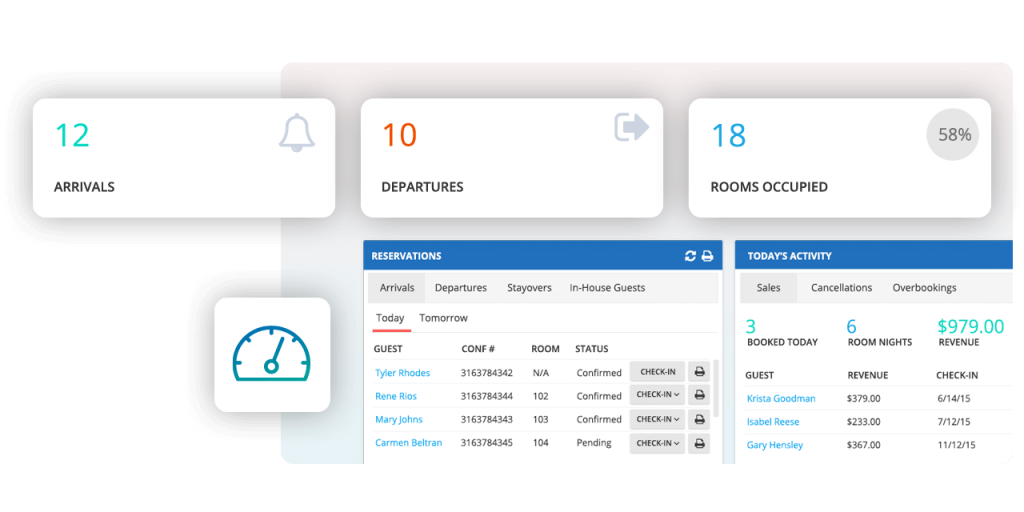Hotel Property Management Systems: Features and Benefits
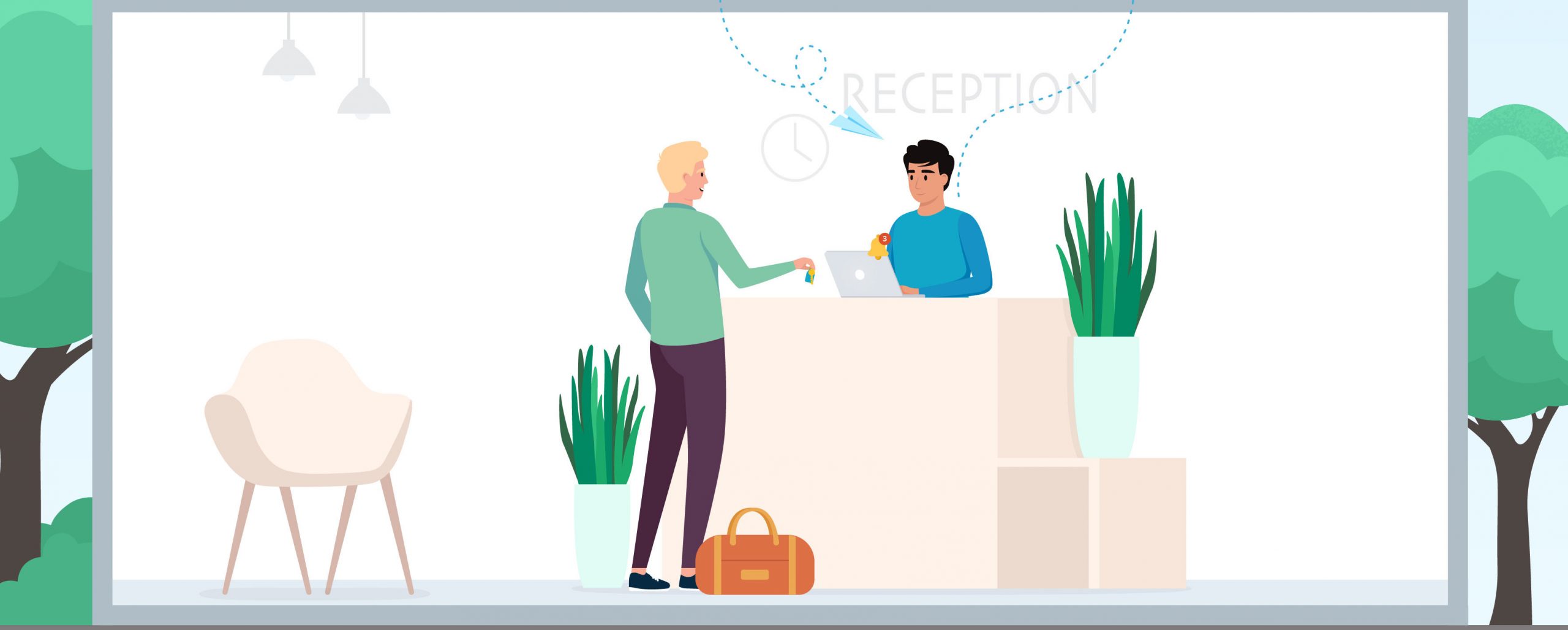
No matter what size your hotel business is, managing property requires great effort. You need to carefully track all operations from administration and managing customer data to reservation and accounting.
But how can you make your business work effectively in such chaos? The solution is to “digitalize” your hotel property management and automate daily operations by using a hotel property management system (PMS).
In this article, we’ll take a closer look at what a hotel property management software is, explain the core features of a hotel PMS, consider the most common challenges you may face when developing a hotel property management system, and share our own experience.
If you want to know more about custom property management system development for hotels – this blog post reveals everything you need to know. Here we go!
Definition and purpose of hotel property management systems
Property management systems (PMS) are applications for the operation of accommodations businesses. A centralized computer system allows organizing, scheduling, and performing the day-to-day functions and transactions in hospitality accommodations and residential and commercial rental properties. Hotel PMS solutions cater exclusively to the owners and managers of hotels, motels, hostels, resorts, and the like.
Traditionally, a hotel PMS was considered as software that enables hotel businesses to optimize their front-office capabilities by replacing time-intensive, paper and spreadsheet-heavy processes. User-friendly hotel management system features helped with reservations, guest check-in/check-out, room assignment, room rate management, and billing. They often required a significant amount of hardware that was managed on-premises.
What is a PMS systems’ role in the hospitality industry nowadays? The automation of common front-office and administrative tasks remains the top priority. It’s important to note that automation can save forward-thinking businesses up to 70%. All hotel PMS include the critical modules of reservation, front-desk operations, and housekeeping. On top of all that, modern hotel PMS solutions include a range of features that promote specialized personalized guest experiences.
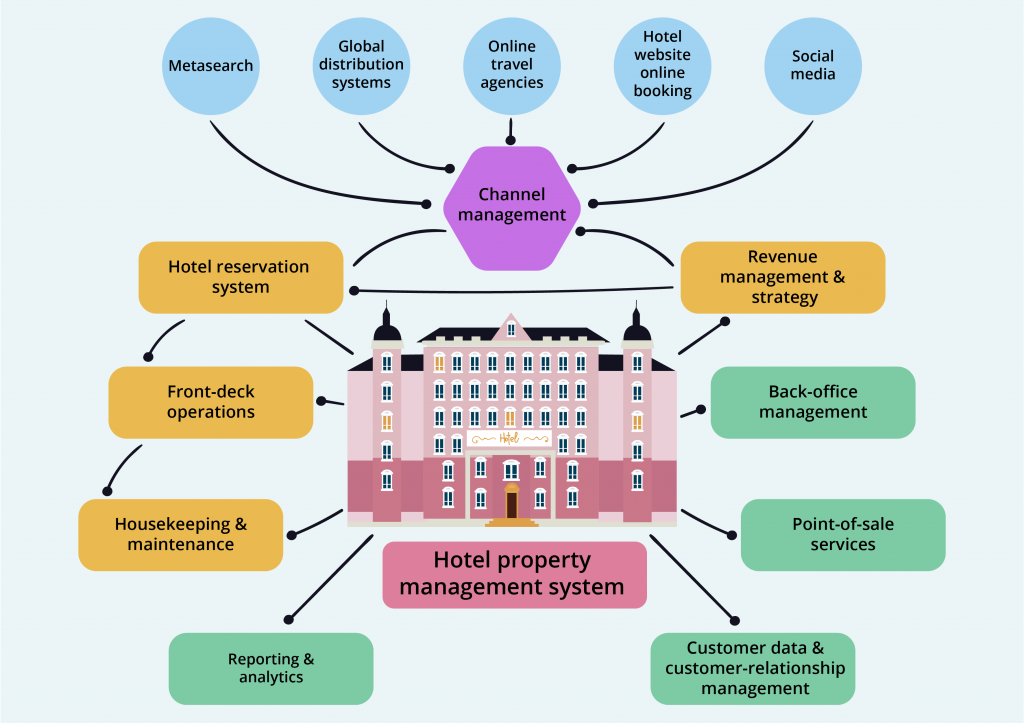
Now that we know how a hotel PMS works, let’s talk about the benefits a property management system can bring to the hotel industry.
What are the benefits of using hotel property management solutions?
The advantages of a modern PMS for the hotel business include, but are not limited to:
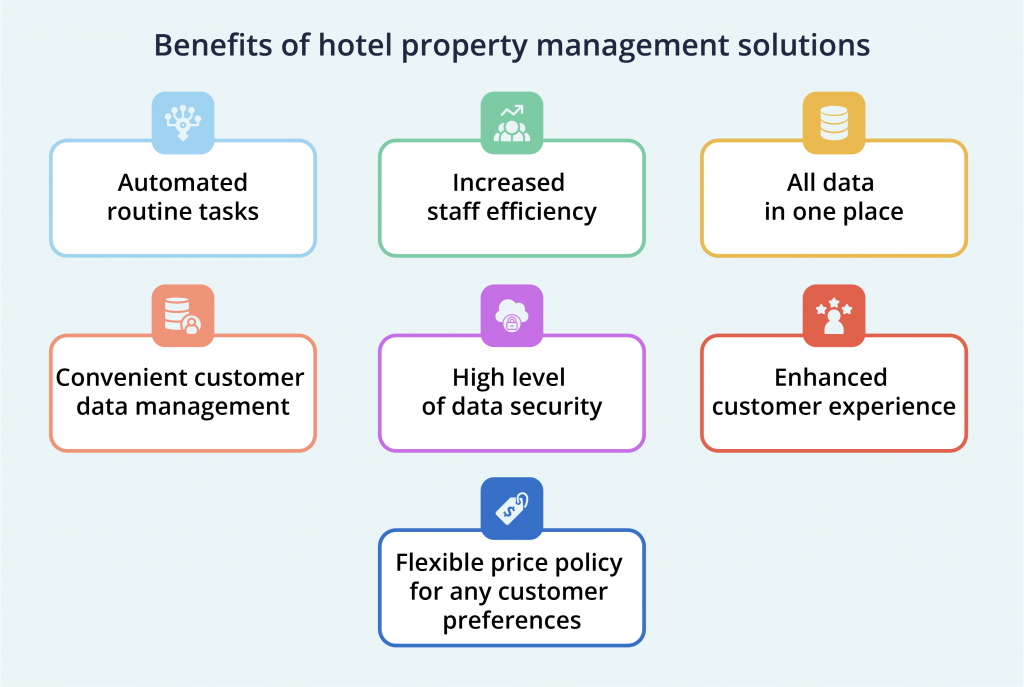
Enhanced check-in/check-out capabilities
A mobile-enabled cloud hotel PMS empowers a hotel’s front-desk staff to check guests in and out, assign rooms, and enable guest services anytime from any place.
Increased housekeeping efficiency
The software can alert housekeeping staff in real-time of an early arriving guest whose room must be prepared or update the staff when guests check out. It helps identify and manage room maintenance needs faster.
All data in one place
Numerous tasks that were previously handled by different programs can be done from one central location. Management can keep everything in one place where it won’t be lost. Employees can access, update, and track all relevant information across all departments and multiple property locations. Moreover, they can do it from any location and collaborate more effectively.
Improved revenue management
Hotel property management software connects operations and financial processes. It leverages pre-built integrations to accounts receivable, accounts payable, payment gateways, point-of-sale systems, and payment processors. Moreover, analytics, reporting, and competitive intelligence help improve the hotel’s business operations.
Better customer data management
Hotel PMS consolidates and securely keeps all customer data, helping to form detailed guest profiles and ensure compliance with applicable consumer data protection regulations. The understanding of customer buying patterns enables hotel businesses to develop more targeted packages and services.
Increased employee productivity and engagement
User-friendly interfaces facilitate the training of hotel staff and reduce the likelihood of errors. The staff can save hours on routine administrative tasks that can be automated while concentrating on adding value instead.
High data security
When all of the hotel’s data is stored in the cloud, it’s available for download and analysis and protected by the latest technology. The information in your cloud hotel PMS is encrypted and securely backed up. Even if a computer breaks or a laptop is lost, the hotel data will remain accessible to the hotel PMS users.
Enhanced guest experience
The automation of daily operations and administrative tasks promotes a consistent provision of quality services. Moreover, hotel PMS remembers customer preferences coupled with customer feedback analysis, which gives hotel employees helpful insights to help ensure better guest experiences.
As you can see, hotel PMS offers many advantages for the hotel business. That’s all thanks to its functionality. Let’s take a look at the basic feature set that any custom property management system for the hotel business should have.
What are the top must-have features of a hotel management system?
A modern hotel PMS combines multiple work environments in a single piece of software. Depending on your business needs, the combination of modules in a system and functionalities within a module can vary. However, a robust hotel operating software should manage, at a minimum, the following tasks:
#1 Reservation and front-desk operations
The reservation service holding all inventory information and dates should be integrated with the website booking engine and other distribution channels. Convenient and user-friendly dashboards display the current and upcoming reservations to hotel management. They can check room availability and status, keep track of reservations and guests, and move them around as needed. This module checks guests in and out, issues key cards, tracks room allocation, manages room-related requests, processes payments and issues receipts to guests, performs night and shift audits, and more in one secure system.
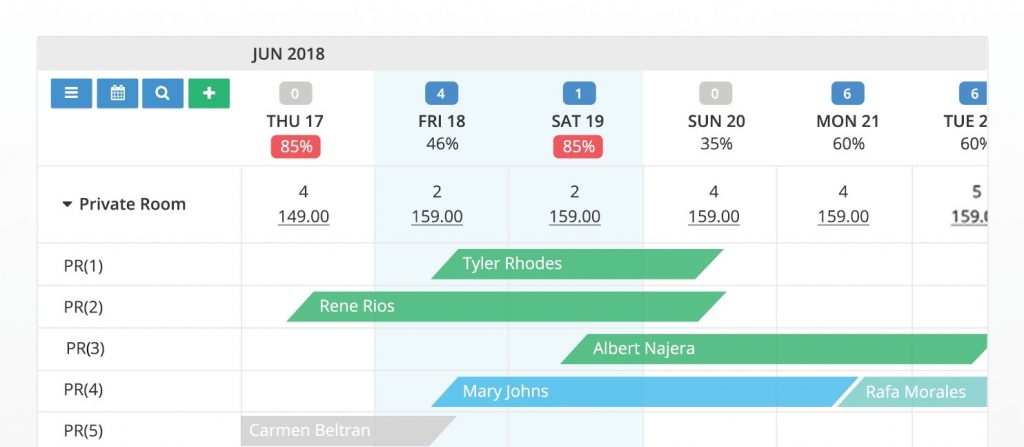
#2 Distribution channel management
To ensure visibility to different audiences, hospitality businesses have to appear on multiple online distribution channels. Bookings come from a hotel’s website, travel websites and mobile applications, corporate clients and airlines, travel agents, and other sources. Hotel property management software helps expand the business’ reach across the Internet and manage multiple channels. It integrates with online travel agencies (OTAs) and global distribution systems (GDSs) and enables listing rooms and rates on various channels and through third-party booking partners.
While a centralized hotel booking engine handles direct sales, an online channel manager controls the distribution channels. This feature helps eliminate manual management and facilitates booking-related transactions. The software connects directly to the reservation system and provides a single interface to control and distribute inventories across the various channels. All bookings are synchronized, and room availability is updated in real-time across all channels. It also ensures consistency in terms of the hotel’s rates and discounts.
#3 Housekeeping & maintenance management
Housekeeping functionality includes management of room statuses, assignments for room cleaning, and tracking housekeepers’ tasks. The module automates management tasks and connects housekeeping staff to the front office. The software should identify rooms that need to be cleaned or prepared for the next arriving guest and assign tasks to the responsible employees. A front-office manager can track the status of each room and organize maintenance reports. Cloud-based hotel PMS enables housekeepers to update the status of their tasks or rooms on their smartphone or tablet once everything is done. The staff can also upload photos of any issues so that the maintenance department can assess and repair them quickly.

A maintenance management system helps plan and organize maintenance operations, record hotel disruptions and repairs, manage maintenance reports, and track maintenance requests and update their statuses.
#4 Revenue management and strategy
A hotel revenue management system provides a secure and straightforward interface for tracking, managing, and analyzing payments. It accepts online payments, instantly validating credit/debit card details, and in case of non-payment, helps track and manage outstanding charges.
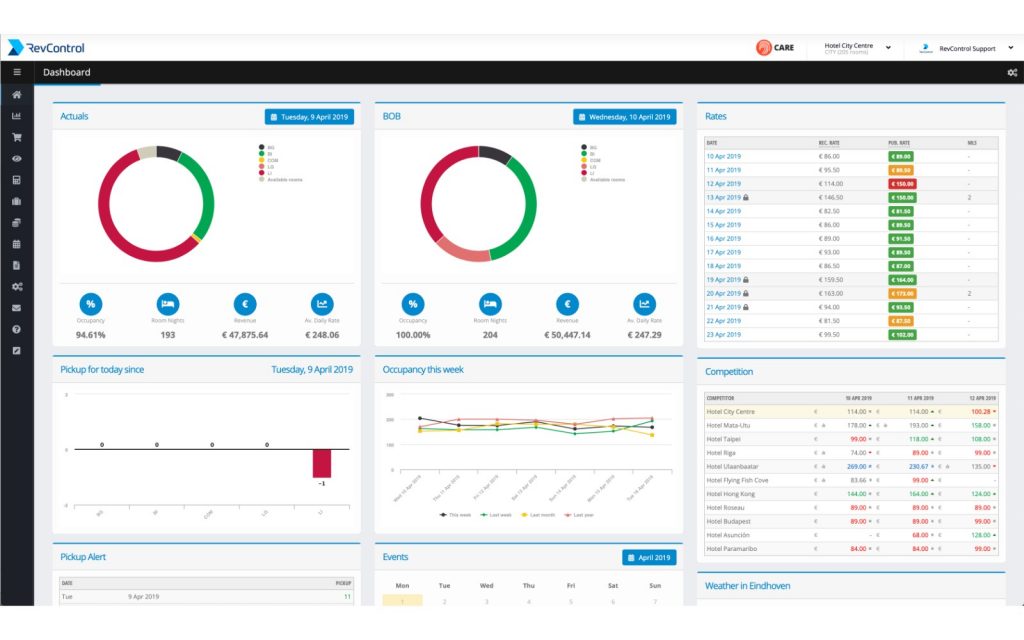
Hotel property management software also empowers hoteliers to implement flexible, data-driven revenue management strategies. They track key performance indicators like occupancy, revenue per available room (RevPAR), and average daily rate (ADR). Special algorithms use historical data and info on competitors’ rates, weather, or local events to help determine optimal rates. Dedicated pricing tools enable hotel managers to adjust room prices across all distribution channels automatically, set up restrictions, and create packages and special offers. Revenue management systems also help hoteliers modify the processes to achieve better results and control finances.
#5 Customer data and customer relationships management
Hotels should be able to keep in touch with customers before, during, and after their stay. A CRM integrated with the front-desk and reservation systems collect and organize guest contact information and other data from these sources. A database of guest information can help hoteliers develop marketing strategies and membership and loyalty programs for better-personalized guest experiences. Hotel PMS systems also provide a comprehensive feedback management feature that captures guest feedback. The information can be used on the hotel’s website, travel booking sites and mobile apps, or surveys.
If a hotel or resort chain has its own CRM system, the hotel PMS should integrate with it.
#6 Reporting and analytics
Comprehensive and timely reporting is essential to hotel business growth. Depending on the software, hotel PMS systems can generate various types of automated reports: night audit, shift audit, room and tax reports, departure/arrival, housekeeping, or other ongoing reporting. Below you can see an example of reports on historical bookings.
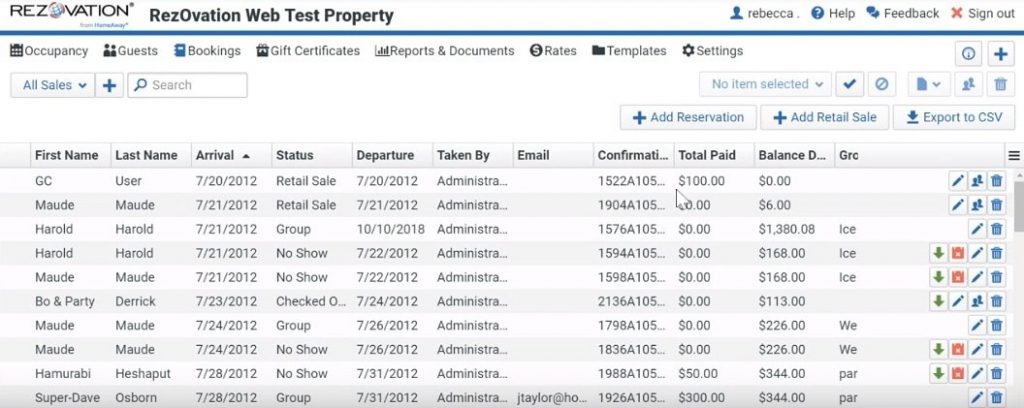
This module facilitates keeping track of revenue, reservations, and inventory and provides valuable insights into hotel performance through daily reports, occupancy rate, ADR, and RevPAR. The right hotel PMS also helps to comply with local tax reporting requirements and regulations.
#7 Back-office management
This module helps streamline, improve visibility, and optimize back-office and administrative hotel operations. It may include the following functions:
- Human resources management, including shift management and staff invoicing
- Reviews management
- Event management and catering
- Conference room, spa, and gym management
- Sales and catering execution for group bookings
- Assets management
- Inventory analysis
- Consumption costs and hotel spending analysis
- Sales and management of promotional campaigns
The back-office module may offer internal messaging, reports of guest’s arrival times, the ability to manage campaigns, send emails, and sometimes, basic accounting.
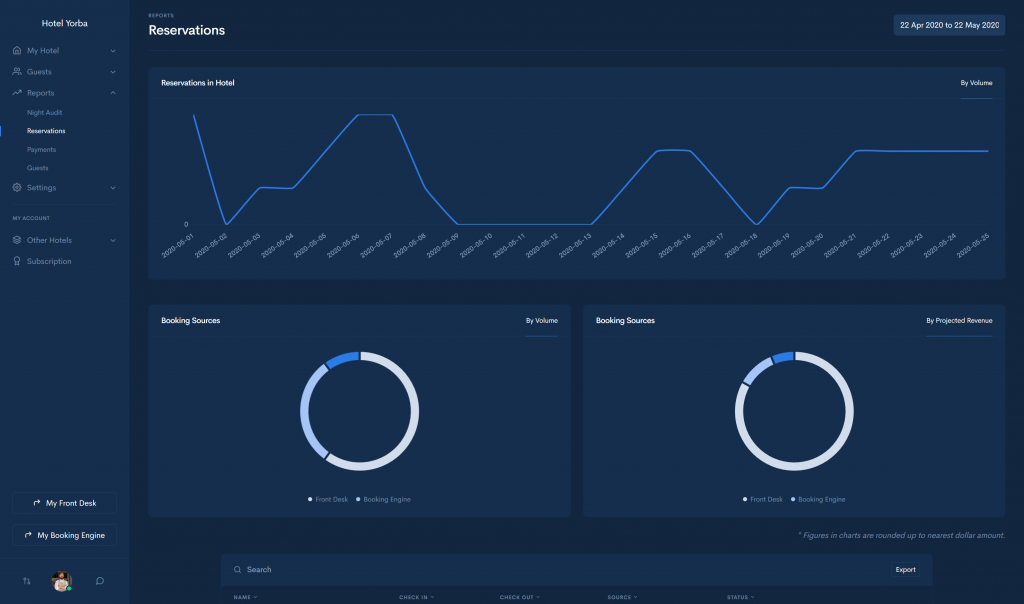
#8 Point-of-sale (POS) services
Many hotels have restaurants, banquet and conference halls, gyms, day spas, gift shops, and other premises. They can also include extra costs or discounts on food and beverages, in-room services, mini-bar items, TV, or Wi-Fi on the guest folio. The POS function of hotel operating systems helps manage all payments accepted through multiple point-of-sale terminals smoothly, automates transactions, and keeps the data in one location.
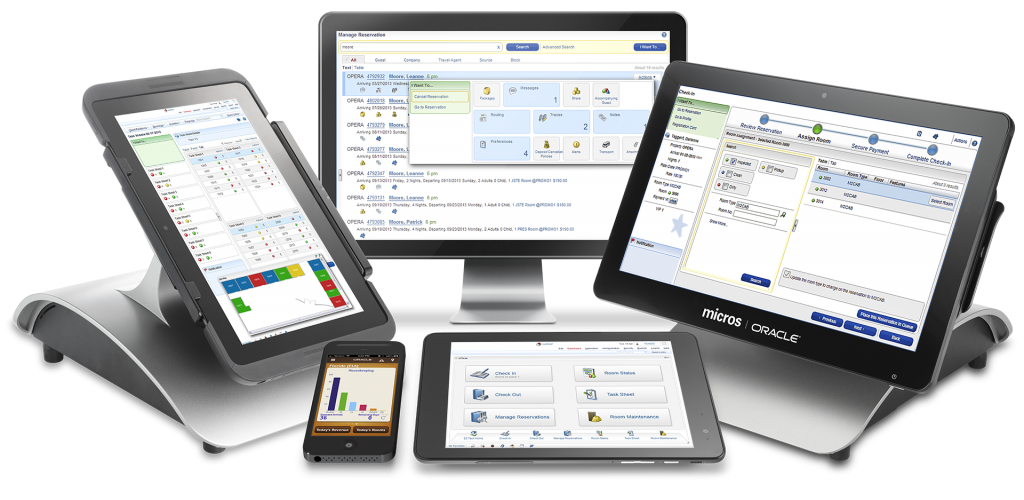
We examined the main features that a system should include. To understand how an ultimate product can look and function, let’s consider a few real-world examples of a hotel PMS.
Examples of property management systems in hotels
Oracle Hospitality
Oracle Hospitality is one more example of a property management system in hotels. The software includes several valuable features that facilitate daily hotel activities such as direct bookings, housekeeping management, personalized services, transaction operations, reporting, and analytics.
Cloudbeds
Cloudbeds is a hotel property management system that allows hotels to manage the booking process easily, arrange payments, quickly check-in and outs, and collect data to analyze the market and make the right pricing decision. Cloudbeds allows its users to optimize their daily routine tasks, save time, and increase service quality in their hotels.
eZee Absolute
eZee Absolute is an all-in-one management system that helps hotels to automate their day-to-day operations such as reservations, back-office, transactions, housekeeping, etc. Moreover, this hotel PMS has a mobile app that offers excellent customer service allowing guests to check-in themselves or request needed services.
Above, we considered some examples of popular PMSs in hotels. One day your product may also be on this list. And to make your hotel property management system development successful, you’ll want to be aware of some challenges you may face. Let’s consider them!
Challenges you may face when developing a custom hotel property management system
There are some common challenges of building a hotel management system you should know beforehand to avoid them. Let’s look at the most common problems a hotel PMS may face and ways to solve them.
Product viability
For your product to be truly viable and cover all your business needs, you should first validate the idea. For example, at Alternative-spaces, we offer a product discovery stage that guarantees our clients have a feasible product idea, define project complexity, and assess possible risks. This stage establishes the basis for the success of your future product.
Maintaining privacy and security
Security is one of the main challenges you will likely face when starting hotel management system development. Your system will store and process a great deal of sensitive data such as the personal data of your customers, data on hotel income, etc. To avoid hacking and information leakage, you need to ensure necessary security measures. First of all, make sure you encrypt personal data so hackers can’t harm your business. Also, you should control access by requiring unique credentials for each hotel PMS user and implementing multi-factor authentication.
Ensuring intuitive user experience and navigation
Many hotels have routine tasks that need to be done quickly and efficiently. Therefore, when creating a system, it’s necessary to carefully think through an attractive user interface and intuitive user experience. The main functionality must be available in one click. For example, you should build a dashboard that shows the hotel’s occupancy from a bird’s eye view.
Need help with design? Our experts understand UI/UX best practices and know how to meet client’s requirements and their target audience’s needs by delivering innovative design solutions.
Alternative-spaces experience
For 20+ years, Alternative-spaces experts have created products of various industries, sizes, and complexity. We complete 500+ projects each year, including software development for hotels, booking websites, travel apps, etc.
Read also: How to Develop Your Travel Mobile App
For example, utilizing proven and latest technologies, we’ve created a booking platform that allows gay travelers worldwide to rent desired apartments comfortably and safely. Travelers can search these accommodations in 200 countries, book apartments online, and view and leave a review.
Our Alternative-spaces team designs and develops software according to your travel and tourism business needs and goals. We have 300+ talented multi-dimensional experts that will be delighted to assist you in realizing your project idea.
Ready to revolutionize the way your hotel business works?
To remain competitive, hoteliers are jumping through hoops to meet customers’ needs and expectations throughout the experience. This includes online search, booking process, on-property interaction with the hotel staff, in-room experience, and post-stay feedback on social media. And here, hotel property management software comes in handy.
Despite the fact there are ready-made solutions, they cannot compete with a custom hotel management system. Custom solutions can have tremendous benefits. The main one is management software that totally meets your specific hotel business needs. Besides reducing time spent on administrative work, custom hotel PMS will enhance your guests’ services, leading to great loyalty and increased revenue.
Are you about building a custom property management system for your hotel business? Contact us to get a technologically advanced and cost-efficient hotel PMS development solution!
Frequently Asked Questions
- What is a hotel management system?
A hotel property management system allows hotels of any size to effectively manage their daily operations like reservation, housekeeping, billing, etc.
- What are the essential functions of a hotel property management system?
We recommend you include the following features:
- Reservation (to see the current and upcoming reservations, provide online booking, check room availability);
- Housekeeping (to manage room statuses, assign room cleaning, and track housekeepers’ tasks);
- Customer relationships management (to collect and organize guests contact information)
- Back-office management (to streamline administrative hotel operations)
- Point-of-sale (POS) services (to manage all payments, automate transactions, and keep the data in one place)
- What are the main advantages of a custom hotel property management system?
Automated routine tasks, increased staff efficiency, all data in one place, convenient customer data management, high level of data security, and enhanced customer experience.
- Is the management software helpful in expanding the hotel business?
Indeed! The right hotel management software features significantly optimize your daily operations while comprehensive, timely reporting gives valuable insights to help manage your business effectively.
- How much does custom hotel property management system development cost?
Hotel property management system development costs directly depend on your project requirements, its complexity, team size, number of required features, design, and so on. For example, building an MVP version with only essential features will take approximately ~1,000 hours. The average hourly rate in Eastern Europe is $50 per hour. Accordingly, the development will cost approximately $55,000.
But this is only a rough example of cost. The actual amount depends on your requirements and the specifics of the project.
Content created by our partner, Onix-systems.
Source: https://onix-systems.com/blog/the-features-and-benefits-of-hotel-property-management-systems Home
Home